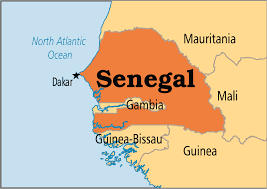APA-Dakar (Senegal) – While endogenous shocks tested economic growth last year, Senegal’s new leaders have pledged to implement “fiscal discipline” and “fiscal responsibility.”
In Senegal, 2023 was not just synonymous with political violence. Economic growth during this period had proved “resilient” against a backdrop of tensions combined with persistent, albeit falling, inflation, according to a new World Bank report on the economic situation in this West African country, which for nearly three months has been led by “sovereign” and “pan-Africanist” leaders.
Wilfried Kwame, Senior Economist at the international financial institution and one of the authors of the report presented to the press on Wednesday 12 June in Dakar, explained that last year, the dynamism of the primary and secondary sectors underpinned economic activity despite “disruptions” in the services sector and a
“deceleration in export growth.”
He pointed out that gross domestic product (GDP) stood at 4.3 percent, up from 3.8 percent in 2022. At the same time, the planned reduction in the fiscal deficit was achieved, resulting in a deficit of 5.1 percent of GDP, slightly higher than the target of 4.9 percent. Among other things, higher tax revenues contributed to this deficit.
In this 68-page document, the World Bank investigators focused on two aspects: poverty and equity in a context of multiple crises, and strategies to increase tax revenue collection via personal income tax.
“Tax reforms and improvements to personal income tax can increase domestic revenue by broadening the tax base and strengthening the application of the legal framework, without increasing poverty or
inequality,” Mr. Kwame recommended.
Narrow tax base
He and his colleagues noted that growing international and regional uncertainties required “proactive action” to preserve the socio-economic progress made in Senegal over the past decade. In the second half of 2023, political instability, with violent demonstrations linked to the legal cases of current Prime Minister Ousmane Sonko, who was then the leader of the opposition, “slowed growth considerably.”
The other factor is the tightening of international and regional financial markets, caused in part by the embargo imposed by the Economic Community of West African States (ECOWAS) on Mali in responseto the coup on 20 August followed by the “rectification” of the transition eight months later.
Mali is one of Senegal’s leading trading partners. This situation “aggravated the budgetary and external
imbalances” of the second largest economy in the West African Economic and Monetary Union (UEMOA), Wilfried Kwame and his team found.
The report also shows that informality, the narrowness of the tax base and the limited application of legislation hamper the ability of direct taxes to increase revenue and correct inequalities before taxation. However, the acceleration of reforms to tax administration and personal income tax policies “can help to stimulate efforts to
mobilise domestic revenue” in a country where the economy is more marked in the informal sector, according to the WB experts, who point out that the incidence of poverty in Senegal has remained “stable” with marked regional differences, and a significant decline in certain areas such as the Senegal River Valley.
The report was presented in the presence of a number of economists, leading figures from civil society and public finance officials. Adama Seck, coordinator of the study and planning unit at Senegal’s Ministry of Finance and Budget, said that the report highlighted “the urgent need to increase” tax revenues in order to strengthen Senegal’s economic resilience in the face of future shocks, at a time when several countries are currently experiencing the aftershocks of the Russia-Ukraine war following the devastating Covid-19 pandemic.
New budget guidelines
In this regard, he recalled the new authorities’ guidelines on “budgetary discipline and fiscal responsibility.” As tax and property inspectors, President Bassirou Diomaye Faye and Prime Minister Ousmane Sonko are aware that these two pillars constitute the “indispensable foundation for guaranteeing the viability of public finances and debt in the medium term,” Mr. Seck said.
Keiko Miwa, the World Bank’s Director of Operations for Cabo Verde, Gambia, Guinea-Bissau, Mauritania and Senegal, hailed the determination of the new Senegalese authorities to strengthen transparency and the management of public finances.
This path “is an opportunity that reinforces Senegal’s positive economic outlook in the medium term. In the short term, however, these prospects remain conditional on a commitment to fiscal consolidation and the implementation of transformative reforms, the pillars of macroeconomic stability,” she declared.
During the debates, an international consultant reminded the audience of the state’s obligation to create the conditions for the emergence of strong national champions in several sectors, especially in the era
of hydrocarbon production which Senegal entered on 11 June 2024, with a view to “recovering new resources” from taxation. In response, the President of the National Confederation of Senegalese Employers
(CNES), one of the country’s employers’ associations, defended the formal private sector, saying that it pays “too much tax.”
Adama Lam therefore called on the government to review “the whole panoply of taxes” imposed on them and to integrate them into the market for resources such as oil and gas, which can “generate fixed capital” for
the benefit of the Senegalese economy.
ODL/ac/fss/as/APA


